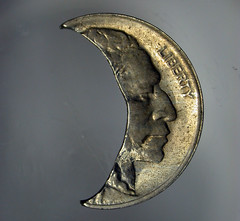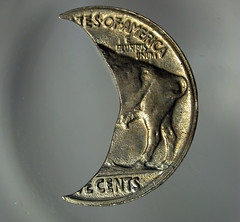
PREV ARTICLE
NEXT ARTICLE
FULL ISSUE
PREV FULL ISSUE
VOCABULARY TERM: CLIPPED PLANCHETDick Johnson submitted this entry from his Encyclopedia of Coin and Medal Terminology. Thanks. -Editor
  This is an extreme clipped planchet. The diagnostic for a genuine clipped planchet is the overhang around the inner edge of the piece. This is caused by metal flow over the edge at the rim/edge juncture during striking. Counterfeit clipping cannot reproduce this formation. Photos Fred Weinberg. Clipped Planchet. An imperfectly punched blank or planchet in which the metal strip (from which blanks are punched) did not advance far enough under the blanking punch and "clipped" a portion of a previous hole. Clipped planchets range from only a small percentage of the total blank missing to crescent shaped pieces with 60% or more missing. In production blanking all blanks are fed into a riddling drum in which such malformed blanks drop out and full-circle blanks are passed on to the next process. These clipped and imperfectly formed planchets – called SCISSEL – are melted and reprocessed. If the positioning of strip is near the edge or end of the strip this could cause a straight edge clip (less common). If the edge had not been machined straight this could cause a ragged edge clip. More dramatic perhaps are multiple clips that exist when this error of positioning occurs in two (double clipped), three or (rarely) four places. (More than four are impossible.) An elliptical or oval clip is the name given to a struck piece on an oval (instead of circular) planchet. It occurs when the blank does not fall into the hopper but rests instead on the strip and is planked with the next planchet, it is not full round but is cut into two pieces – one oval and one crescent – either or both of which may end up being fed into the coining press. When a clipped planchet is struck into a coin or medal, metal flows over the edge of the clip forming minute overhang at the RIM/EDGE JUNCTURE. Counterfeit clips – intended for
collectors – have been made by shearing off small circular portions after the item is struck, but this can be detected by the sharp angular corners without the overhang at the rim/edge juncture. See
BLANKING
 Wayne Homren, Editor The Numismatic Bibliomania Society is a non-profit organization promoting numismatic literature. See our web site at coinbooks.org. To submit items for publication in The E-Sylum, write to the Editor at this address: whomren@gmail.com To subscribe go to: https://my.binhost.com/lists/listinfo/esylum All Rights Reserved. NBS Home Page Contact the NBS webmaster 
|